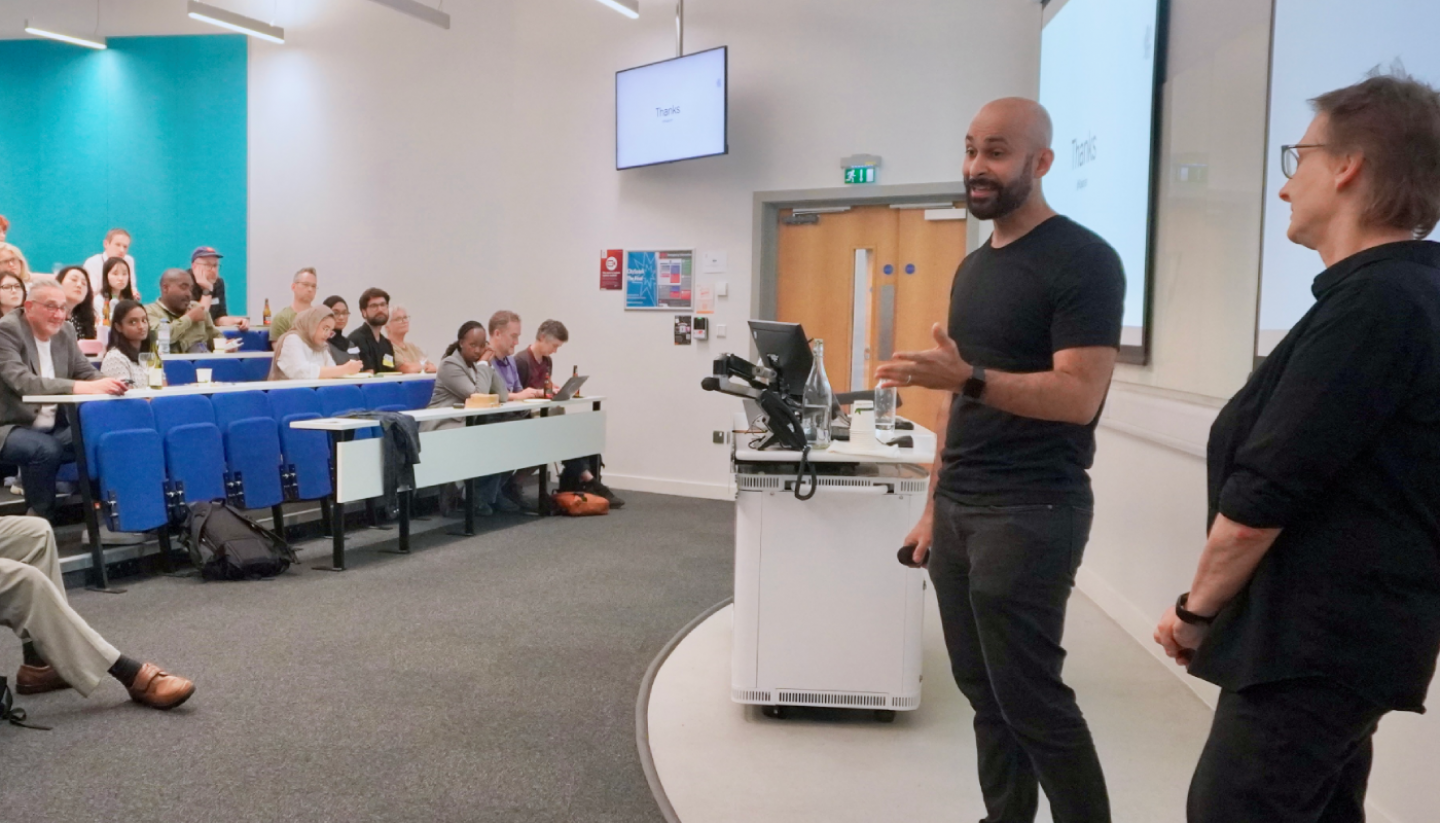The annual conference hosted by the Centre for Human-Computer Interaction Design (HCID) and The Interaction Lab included talks on the accessibility of search engines, tech in farming, and teaching sustainability in higher education.
Published
On Tuesday 24 June, the Centre for Human-Computer Interaction Design (HCID) at City St George’s, University of London held its annual conference on campus.
HCID Co-Director Professor Stephanie Wilson and event organiser Stuart Scott, manager at HCID’s consultancy, The Interaction Lab, opened the conference.
They explained how the conference theme of "paradigm shift" invited interested parties to explore how designers should be reacting to the major changes currently impacting society, from technology to politics to climate.
Human-computer interaction design refers to the relationship between people and technology and the decisions made by tech developers.
City St George’s HCID research centre seeks to shape the conversation around these design practices and shape policy.
HCID 2025 featured several talks delivered by City St George’s staff, including former staff and alumni.
The conference featured 21 concurrent talks run in three parallel tracks: Sustainability/Accessibility, Design/Practice and Debating AI.
These talks were bookended by three keynotes delivered by Christoph Hassler (H:DEI) in the morning, followed by talks from Dr Reem Talhouk (Northumbria University) and Raj Arjan (Google) in the evening.
Presenters
Digital agriculture: (Un)responsible innovation for sustainable food futures
Leading the discussion on sustainability was Dr Sebastian Prost, Lecturer in Human-Computer Interaction at City St George’s. Their research focuses on how new digital technologies can affect farmers’ livelihoods.
While there are many new tech advancements in the agricultural sector – such as GPS-automated tractors, and drones that analyse camera footage to identify and spot spray crops with insecticides – they noted that many digital tech solutions are “incompatible” with agroecological values.
Dr Prost believes farmers need to have technological sovereignty as well as food sovereignty, which means farmers have the right to determine what kinds of technologies are appropriate for their food production and farming practices.
They said:
“What kind of digital technology can we conceive that is supporting rather than threatening values and sovereignty of farmers?"
Battling monsters for credit: Introducing interdisciplinary education for climate and sustainability
Dom Pates, Senior Educational Technologist at City St George’s, delivered a presentation on the Sustainability and Climate Change module he founded in The City Law School, which is led by Dr Jed Odermatt also of the School.
The module aims to teach students about sustainability and climate change and to empower them to make positive action to better the world.
He said:
“The Internet is Hard. Is Words”: Investigating information search difficulties experienced by people with aphasia and strategies for combatting them
"When you go to Google, you're pretty reliant on your language, aren't you?” said Dr Andrew Macfarlane.
A joint discussion between Dr Stephann Makri, Senior Lecturer for Centre for HCID, and Dr Andrew Macfarlane, Reader in Information Retrieval at City St George’s, discussed how the language processing disorder aphasia affects people’s ability to use search engines like Google or Bing.
Aphasia frequently occurs after someone has experienced a stroke and affects the ability to communicate or understand speech.
Dr Makri said:
Audience members
Keynote Talks
Facing the Poly-Crisis: How Strategic Design Can Help Navigate Chaos
Christoph Hassler, a freelance designer and consultant of H:DEI, incited the beginning discussions of the event by speaking of “Facing the Poly-crisis”.
He spoke about de-colonizing technology, and about the risks of digitization for marginalized groups. He said:
“When considering design, we must think about the history of injustice, innovation, and successes of spaces and places before beginning new work. Engage with the past to heal, build trust, and deepen understanding of yourself and others”.
Humanitarian AI: A shift or a continuation?
Dr Reem Talhouk from Northumberland University, discussed using generative AI in her research on digital literacy among refugees and asylum speakers.
She noticed parallels in digital literacy and media literacy, which is “being able to stop and question things.”
She is working with the Guardian Foundation to fold their news literacy work into the project.
The only constant is change
Raj Arjan Senior Product Manager at Google, closed out the conference by sharing insights into his research as UX researcher at Google, and then a Product Manager at the company.
Raj previously worked at the HCID and studied at both undergraduate and postgraduate level at City St George’s Department of Computer Science.
He reflected on one of models he uses to make user focus groups – where he facilitates feedback on Google products – fun and engaging.
In the model, he uses emojis showing different emotions and icons for different apps to test how users feel about the apps throughout taking part in the group.
He said:

Find out more
The HCID research centre delivers the postgraduate programme Human-Computer Interaction Design MSc.
Learn more about HCID’s charter on their website.
Byline: This article was written by Amandeep Chandan, Communications Assistant in City St George’s Press Office team.










